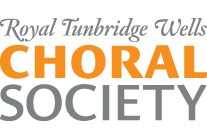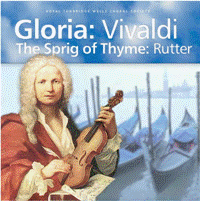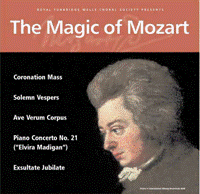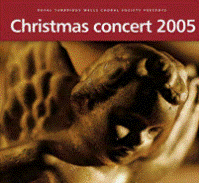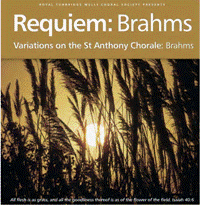Programmes and Reviews – 102nd season (2005-6)
Summer Concert
Vivaldi’s Gloria
Rutter’s The Sprig of Thyme
Vale Royal Methodist Church, 24th June 2006
It was good to see a capacity audience supporting the latest concert given by the Royal Tunbridge Wells Choral Society last Saturday (24 June) at Vale Royal Methodist Church, Tunbridge Wells. On this occasion the choral forces were strengthened with additional voices from potential new members and by a large choir from Somerhill School, Tonbridge.
The programme was ideal for a beautiful midsummer’s evening with nothing too heavy or serious. The concert opened with John Rutter’s “The Sprig of Thyme”, a collection of 11 traditional songs which, to quote the composer, “brought delight and pleasure during postwar times now tinged with nostalgia because for the most part they are forgotten and gone from our lives”. His settings are imaginative using diverse combinations – songs for upper voices only, songs for gentlemen only, songs for the whole choir, some accompanied, some with piano, some with orchestra. The Somerhill School choir joined in with the first and last songs and the girls sang with the sopranos for “I know where I’m going”, their youthful fresh voices blending surprisingly well with the adult singers.
It is unusual these days to see so many tenors and basses (24 in all) and they gave a good account of themselves in their numbers with clear diction and good tone for the most part — some were glued to their scores much of the time which is always a concern for the conductor! The upper voices were clear and made a really lovely, unforced sound; however, the words were not always clear because of a lack of consonants in places. They had clearly been well rehearsed, with neat endings to phrases, good balance between the voices and well controlled dynamics.
Between the choral works were two instrumental interludes. The Sussex Camerata string quartet played two short arrangements. The first was Shostakovitch’s Romance from his filmscore for The Gadfly, well-known to all Classic FM listeners, followed by Gershwin´s ever popular Summertime, both exquisitely played. Then came a frothy organ Sortie by Frenchman Lefebure-Wely played with considerable aplomb by the Society´s director of music, Richard Jenkinson; an item which went down well with the audience judging by the applause!
The concert concluded with Vivaldi´s well-known Gloria, with the children from Somerhill School adding brightness to the soprano line throughout. They had clearly been well prepared — this is exhausting music for adults to sing let alone for boys and girls. The advantage of having just one instrument per part was the balance between voices and orchestra — the latter never masked the former but their energy was fundamental to the overall effect. Richard Jenkinson was adventurous in his choice of tempi. Et in terra pax was taken somewhat slower than usual and this allowed the harmonic shifts to make maximum impact whilst Propter magnam gloriam took of at such a pace that it took several bars to settle. The last movement was also taken at a rather exciting tempo which seemed to unsettle players and singers alike.
However, the overall effect of Vivaldi´s masterpiece was most pleasing and the soprano soloists, Sarah Lingard and Harriet Webb were well matched and sang with beautiful tone and considerable confidence.
The orchestral forces comprising strings, oboe, trumpet and piano/continuo were superb throughout, making their contribution tell without ever overshadowing the voices. Richard Jenkinson is to be congratulated for masterminding an evening full of warm but vibrant playing, fine singing and an excellent choice of programme.
© Paul Jeffery
The Magic of Mozart
Coronation Mass
Solemn Vespers
Ave Verum Corpus
Piano Concerto No. 21
Exultate Jubilate
Assembly Hall, Tunbridge Wells, 26th March 2006
In a “star is born” sequence, more appropriate to Hollywood than to Royal Tunbridge Wells, a rehearsal pianist took over as soloist to steal the show with a dazzling performance of a Mozart piano concerto, in the middle of a recent choral concert in the Assembly Hall.
To present a programme of choral music by Mozart to celebrate the 250th anniversary of his birth is a fairly obvious idea. To include a piano concerto in such a programme may be regarded as unorthodox and enterprising. But to invite your rehearsal pianist to take the solo part is nothing less than brilliant – provided, that is, his name is Anthony Zerpa-Falcon.
Under their conductor Richard Jenkinson, the Royal Tunbridge Wells Choral Society and a well-balanced group of soloists – Lesley-Jane Rogers (soprano), Catrin Johnsson (mezzo-soprano), Philip Salmon (tenor) and Andrew Rupp (baritone) – started with a somewhat tentative performance of the Vesperae solennes de confessore, K339. This is a work which, with its sharply contrasting episodes and changes of key, needs more commitment than in fact it received. Not even the soprano Lesley-Jane Rogers in the Laudate Dominum, a section sometimes performed on its own, could bring the music fully to life, and I started to wonder if, perhaps, it had not been given sufficient time in rehearsal.
But such gloomy thoughts were soon dispelled, like clouds on a bright spring day, with the way in which the choir sang Mozart’s sublime setting of the motet Ave, verum corpus, K618. Originally composed not for chorus but for four solo voices, strings and organ, it has become one of the Choral Society’s set pieces which they perform with a radiant sonority and sense of control – a tribute to Richard Jenkinson’s choral training.
There followed a lightening of the atmosphere and some amusement in the stalls as the hydraulic platform slowly raised the Steinway piano, for all the world like a cinema organ of the 1930s, from the bowels of the Assembly Hall to the much higher level of the stage. Barbara Maw’s single A natural to tune the orchestra drew a trickle of applause (although it must be said that she played it very well), and we then settled down to await the arrival of the conductor and the pianist Anthony Zerpa-Falcon, suddenly elevated from his place in the orchestra as organ continuo to become the instrumental soloist of the day.
The opening bars of the C major concerto, K467, were a shock: “surely too fast,” I thought. Then came the piano entry: brilliantly clear and precise, wonderfully elegant and assured. Only later did I learn that it was Anthony who set the tempo with the agreement of the conductor, and he was absolutely right to do so. This was a young man´s interpretation, full of verve, drive and confidence, in which there was no risk of the orchestra supporting the soloist in the plodding manner we hear all too often in this work. In their performance all members of the orchestra matched the delicacy and enthusiasm of Anthony Zerpa-Falcon, and provided a perfect balance to his pianism.
There is a point to make here. Those of us blessed with two good ears hear everything in stereo, left and right. Most of the time we are not even conscious of this. We don´t have to do anything about it – it´s just the way the whole thing works. But at this concert the instruments were by chance arranged in a very unusual way, with the piano well above the orchestra. So there was a sense of vertical up and down in the perceived sound as well as horizontal side to side. I found the experience quite fascinating – but perhaps I have spent too much of my time in the recording business!
To return to the concerto and Anthony Zerpa-Falcon, whose whole approach to the work avoided any risk of sentimentality in the gorgeous (but now notorious) andante. The finale skittered along irresistibly and, like the first movement, included a short but brilliant cadenza by the celebrated pianist and Mozart scholar Géza Anda.
This was a performance to treasure by a name to remember – rarely have I head such waves of applause in the Assembly Hall or anywhere else for that matter. Anthony Zerpa-Falcon will surely go far.
After the interval two choral pieces remained. The Exsultate, jubilate K165 with its celebrated Alleluia, beautifully sung by Lesley-Jane Rogers, followed by probably the most loved of all Mozart´s masses, the so-called “Coronation Mass” in C major, K317. This joyous work is scored in such a way that the solo singers are constantly to be heard – as a quartet, in pairs or in solo lines that contrast dramatically with the choir as a whole. It was given a splendidly coherent performance to remind us that this was, after all, a choral concert, and a very good one at that.
© Robert Hardcastle
Brahms Requiem
Brahms A German Requiem
Academic Festival Overture
Assembly Hall, Tunbridge Wells, 20th November 2005.
In their November concert, the Royal Tunbridge Wells Choral Society presented an all Brahms programme. This was built around Brahms´ masterful German Requiem, but the audience was delicately warmed up with his more understated Variations on the St Anthony Chorale. The programme was carefully directed by Richard Jenkinson, who drew some lovely sounds from the accomplished Bernardi Chamber Ensemble. The woodwind players especially were on top form in the opening, with some fine articulation and mellow sound. Brahms´ orchestration is nothing if not subtle, and Jenkinson, sometimes with a baton and sometimes without, navigated its waters with real precision. The tender 7th variation, so difficult to bring off successfully with its siciliano-esque dotted rhythms, was handled with the care and precision that characterised the whole performance. As with the opening moments of the Requiem, the orchestra responded well to his direction and the colours they produced together were rich and varied ones.“The choral passages… were performed with terrific energy and great conviction”
Even when split by an interval, the Requiem is always an enormous task, with its long choral passages and giant fugues, but in the main these were performed with terrific energy and great conviction by the choir. The sopranos were on fine form, with their top notes ringing out wonderfully well at the climax to the 2nd movement. The performance of the 6th movement, Denn wir haben hie keine bleibende Statt, was a similarly massive one, with the climax “Death, where is thy sting?” thrillingly realised; this was a magnificent moment. Throughout the choir performed with poise and excellent intonation, even if occasionally the tenors got slightly ahead of themselves. This was perhaps a consequence of the rather slow tempos Jenkinson chose for the opening two movements as he was clearly looking to set a scene of transcendental peace. He was, though, not afraid to bring out the bolder moments. The timpani, so important to the dramatic impact of the 2nd movement, were given due prominence. So, too, the horn section, which performed splendidly throughout.
The accomplished soloists Charlotte Kinder (soprano) and Stefan Holmström (baritone) performed with dignity and poise, Holmström in particular with some superb top notes, eloquent vocal phrasing and very clear diction. I wasn´t quite sure why they had to leave the auditorium after each solo when there seemed ample space from where they performed. However, this did not detract from a compelling performance all round of this masterpiece of the 19th century choral repertoire.
© Christopher Dyer
